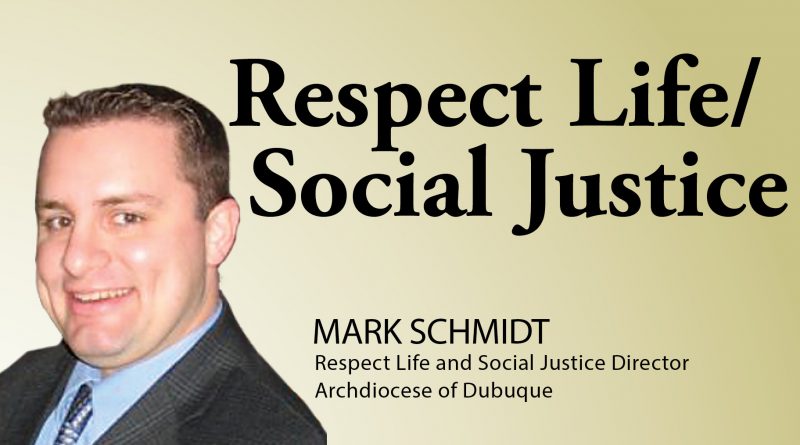Striving for solidarity: what two saints can teach us
By Mark Schmidt
Director of the Office of Respect Life/Social Justice
This past week a bombing occurred at a mosque in Minnesota. While the FBI continues to search for suspects and a motive, Gov. Mark Dayton has called it an “act of terrorism.” The conflict on the Korean Peninsula is ongoing; autocratic authoritarian leaders are on the rise worldwide such as in Turkey and the Philippines; Venezuela took one step closer to autocratic rule, centralizing even more power in the hands of President Maduro; immigrants and refugees are being demonized by many; the RAISE Act was introduced to drastically reduce legal immigration. Bishop Joe Vasquez, head of the U.S. Conference of Catholic Bishops Committee on Migration called the proposal “discriminatory,” urging the president and Congress to reject it. Solidarity is glaringly missing in all of these stories. There seems to be a general wave of rejection of the principle of solidarity globally. And, this week we are reminded of a time in the not-so-distant past when solidarity among peoples broke down almost completely with the onset of the Second World War.
Under the oppression of the Nazis, we saw the denigration of minority groups as “less than.” The Germans even had a name for them, “untermensch,” literally meaning underperson or “sub-human.” Racial and ethnic minorities including blacks, Jews, Poles, Roma, Slavic peoples and others were treated as such. So too were those with disabilities, immigrants, homosexuals, certain religious groups including Catholics, Lutherans and Jehovah’s Witnesses.
St. Maximilian Kolbe and St. Teresa Benedicta of the Cross (Edith Stein) died almost exactly one year apart, in the very same place, suffering the same conditions and the same indignities. But their life stories and how they came to their deaths are very different. Edith Stein was a brilliant German Jewish philosopher who converted to the Catholic faith and eventually entered the Discalced Carmelites. Father Maximilan Kolbe was a German-Polish priest who was born and raised in Poland, the son of a German father and Polish mother.
When the Nazis came to power, Sister Teresa Benedicta of the Cross was transferred by her order to a convent in the Netherlands. Father Kolbe and his order published anti-Nazi materials from their community. Father Kolbe, being half German, was offered the chance to have greater privilege and status under the Nazi occupation. He refused. Further, his monastery continued to shelter refugees, including Jews, in their monastery. In 1941, his monastery would be shut down; he would be arrested and sent to Auschwitz. In the Netherlands, after the Dutch bishops issued a statement condemning Nazi racism in 1942, all converts from Judaism in the Netherlands were rounded up and sent to concentration camps. While Sister Teresa Benedicta had the opportunity to escape, she did not take it, refusing the assistance of a Dutch official. She eventually ended up in Auschwitz in Poland.
In August 1941, after three prisoners attempted escape, the Nazis chose 10 prisoners to starve to death in an underground bunker. One man who was chosen cried out for his family. Upon hearing this man’s cries, Father Kolbe volunteered to take his place. Two weeks later, after outliving all of the other prisoners in the bunker, the guards injected Father Kolbe with carbolic acid; he died shortly afterward. It was Aug. 14, 1941. Sister Teresa Benedicta would arrive at Auschwitz a few weeks shy of the first anniversary of Father Kolbe’s death. And within a week, she too would be murdered by the Nazis.
These two saints are a testament to the principle of solidarity and inspiration in the struggle against persecution. Both St. Teresa Benedicta of the Cross and St. Maximilian Kolbe had the opportunity to escape the death camps. But they chose instead to witness the principle of solidarity by joining in the suffering of others and becoming martyrs. They expressed great compassion, from the original Latin “compasio,” which means to “suffer with.”
They did not simply stand on the sidelines in the face of oppression and attacks on human dignity. They did not respond with violence or with hateful speech. They went as nonviolent witnesses to the teachings of Jesus Christ.
How are we expressing solidarity with others in our community, state, nation and world? When we see others say insulting or prejudiced things, do we speak up? Do we ever participate in denigrating others by repeating stereotypes or ignoring the suffering of others? Are we open to hearing the stories of others who face injustice and see them as experts in their own lives? Do we seek peaceful, nonviolent resolutions? We can be the witnesses to solidarity. We can be agents of change through the grace of God in our world.
We can truly see everyone as our own brothers and sisters and assist others in doing the same.
Learn more about this topic and ways to build a more just society by participating in the Respect Life and Social Justice “Formation for All” session that coincides with the feasts of SS. Maximilian Kolbe and Teresa Bendicta of the Cross. Go to: dbqarch.org/rlsj/formation.



